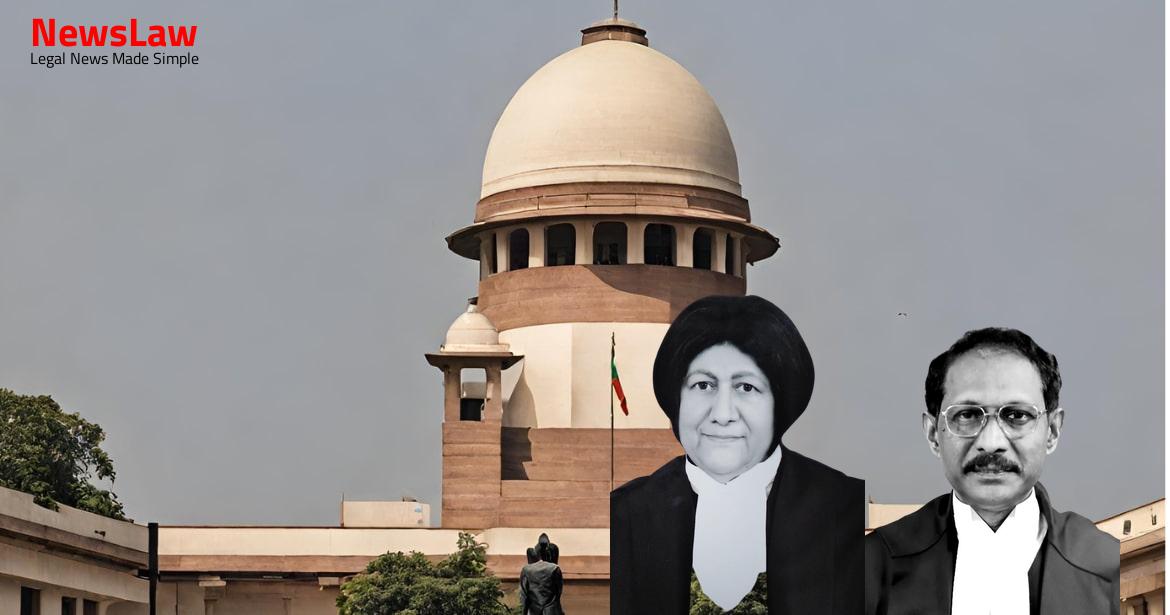In a significant legal development, the Supreme Court has confirmed the conviction under Section 302 IPC in the case pertaining to setting a victim ablaze. The judgment delivered by the Supreme Court sets a precedent for similar cases in the future. It marks a crucial step towards ensuring justice for the victim. Stay tuned for more insights on this important legal matter.
Facts
- The High Court of Judicature at Bombay dismissed the Criminal Appeal No. 723 of 2013
- The appeal was preferred by the appellant, who was the original accused
- The High Court confirmed the judgment and order of conviction passed by the Trial Court
- The original accused was convicted for the offence punishable under Section 302 of the IPC
Also Read: Dispensation with Personal Appearance in Criminal Case: Landmark Judgement by Supreme Court of India
Issue
- The main issue in the present appeal is whether the case falls under Exception 4 to Section 300 IPC or Section 300 fourthly of IPC, determining whether Section 302 IPC or Section 304 Part II IPC is applicable.
- The primary question revolves around the classification of the offense based on the circumstances of the case.
- The court must determine if the case meets the criteria outlined in the relevant sections of the IPC.
- The decision will have significant implications on the severity of the charges and the corresponding punishment.
Also Read: CCC Certificate Equivalence: Setting Precedent for Future Verifications
Arguments
- The counsel for the appellant-original accused argued for altering the conviction from Section 302 IPC to Section 304 Part II IPC.
- The counsel cited the case of Kalu Ram v. State of Rajasthan (2000) 10 SCC 324 to support the plea.
- It was emphasized that at the time of the incident, the accused was under the influence of alcohol and was unable to comprehend his actions.
- The defense claimed that there was no intention to kill the deceased, hence the conviction should fall under Exception 4 to Section 300 IPC and be under Section 304 Part II IPC.
- However, the State’s counsel argued against the application of Exception 4, asserting that the act falls under Section 300 fourthly, constituting murder due to the extreme danger of setting a person on fire.
- The State contended that the subsequent act of pouring water by the accused does not negate the severity of the initial actions.
- The subsequent act of pouring water on the deceased by the accused is deemed as an attempt to disguise guilt
- The pouring of water only occurred when the deceased sought help and made noise
- This act by the accused cannot be considered as a mitigating factor
Also Read: Judgment on Reinstatement of Junior Accounts Clerk Position
Analysis
- In cases where the accused is highly inebriated, the evidence of drunkenness should be considered along with other facts to determine intent.
- In this case, the accused was found to be in complete senses and aware of the consequences of his actions.
- Previous cases like Santosh and Bhagwan have established that drunkenness is not a defense unless it can be proven that the accused lost the requisite intention for the offense.
- The act of pouring kerosene on the victim and setting her on fire led to the death being classified as culpable homicide amounting to murder under Section 300 fourthly of the IPC.
- The defense of drunkenness can only be valid if intoxication renders the accused incapable of forming a particular intention, with the burden of proof resting on the accused.
- Attempts to extinguish the fire or other subsequent actions after a crime cannot mitigate the original offense if the intention to cause harm or death is clear.
- In the Kalu Ram case, similar considerations were made regarding the accused’s conduct in light of his actions and intentions.
- Presence of clear evidence of the accused setting the deceased on fire connects the acts of pouring kerosene and lighting the matchstick, resulting in the death of the deceased.
- Premeditation’s absence does not reduce the offence from murder to culpable homicide not amounting to murder.
- The accused was conscious of the consequences of setting the deceased ablaze.
- Inebriation from alcohol consumption is not a mitigating factor as the accused was in control of his actions.
- The accused was correctly charged under Section 302 IPC as per the evidence.
- No provocation was present for the accused to set the deceased on fire.
- The accused poured kerosene on the deceased as she tried to escape, and then lit a matchstick on her, setting her ablaze.
- The accused was not highly inebriated according to the records.
- Pouring water on the deceased after setting her on fire does not change the severity of the offence.
- The post-mortem revealed that the deceased died due to burn injuries caused intentionally by the accused.
- The accused has been convicted for the offence of murder under Section 302 IPC.
- The Trial Court and the High Court have both agreed on the guilt of the accused.
- The evidence presented in the case strongly supports the conviction under Section 302 IPC.
- Both courts have carefully considered the facts and circumstances of the case before arriving at this conclusion.
Decision
- The present appeal is being dismissed.
- The appeal was found to be lacking and has failed.
- The reasons for dismissal were thoroughly explained in the judgment.
Case Title: SURAJ JAGANNATH JADHAV Vs. THE STATE OF MAHARASHTRA
Case Number: Crl.A. No.-001885-001885 / 2019



